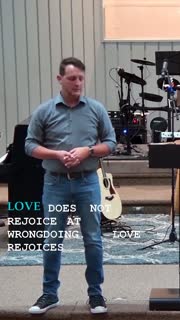Embodying True Love: Lessons from 1 Corinthians 13
Devotional
Sermon Summary
Bible Study Guide
Sermon Clips
1. "And so this is also a time for us to remember that our Heavenly Father is the greatest Father, and that He is our Father. And so we are thankful for Him. But today is Father's Day, and as a country, we celebrate that, and many families are celebrating that today as well." [10:08] (21 seconds)
2. "Jesus is what changes people. Jesus is what changes our city. Jesus is what changes our country. Jesus is what changes the world. And we want people to know Jesus. And so be watching and listening for that. We'll have some announcements about that coming up quickly." [12:31] (13 seconds)
3. "Love is preferring what God prefers. And each of the words that are used throughout the Bible, throughout this chapter to define love, what it is and what it is not, they are verbs. They're action words. We've talked each week how unfortunately this chapter has often been ascribed to marriage. We use this at weddings all the time and it kind of gets in our head." [39:50] (24 seconds)
4. "If you know Jesus, you should be growing in living this out. You should be growing in exhibiting this fruit of love, these actions of love. And so yes, it should apply to marriage. It should apply to a husband and wife relationship. If it's not applying in your marriage, there's a problem. But it doesn't just apply there. It applies between friends, friendship relationships." [41:29] (28 seconds)
5. "Love does not rejoice at wrongdoing. Love rejoices with the truth. These two are, he's like, okay, this is what it doesn't do. Now here's what it does do. It rejoices with the truth. Again, it's the same word rejoice that he uses here, but it's a different form." [01:00:21] (15 seconds)
6. "We can rejoice in truth that someone can read about it, comes to a saving knowledge of Jesus Christ. We can rejoice in truth that God works in lives and changes them. We can rejoice in truth that we have a judicial system even in our country that works. We can rejoice in that without rejoicing in the wrongdoing and the consequences that come from that." [01:01:36] (33 seconds)
7. "I am thankful and each of us should be thankful that God sent Jesus Christ to die for us, to die in our place so that we would not receive what we are. God loved us so much. He sent Jesus to die for us, to die in our place, to take our sins on himself so we could know him." [01:07:22] (32 seconds)
8. "The world will know you're my disciples by your love for one another. He didn't say, now I'm not, hear me correctly here. He didn't say the world will know you're my disciples by having right doctrine. Doctrine's important, okay? Don't hear me wrong. What we believe is very important. But he didn't say the world knows you're mine by your right doctrinal standard." [01:09:24] (22 seconds)
9. "If I were to take a poll of the people that know me, and I were to list these attributes from 1 Corinthians chapter number 13, and ask them, am I known by these attributes? How would that poll come back? Now, we don't have to do that because if we're honest with ourselves, we have a generally good idea of how that would return." [01:11:29] (31 seconds)
10. "I want to be more like Jesus and less like me. I do. I want to prefer what God prefers, not what I prefer. I want to do what God says, not what I want to do. And we all struggle with that. We all wrestle with that. We can sit here and we can say, I know I need to do this and be just like Paul. The good things that I want to do, those things I'm not doing." [01:17:05] (24 seconds)
Ask a question about this sermon
2. "Jesus is what changes people. Jesus is what changes our city. Jesus is what changes our country. Jesus is what changes the world. And we want people to know Jesus. And so be watching and listening for that. We'll have some announcements about that coming up quickly." [12:31] (13 seconds)
3. "Love is preferring what God prefers. And each of the words that are used throughout the Bible, throughout this chapter to define love, what it is and what it is not, they are verbs. They're action words. We've talked each week how unfortunately this chapter has often been ascribed to marriage. We use this at weddings all the time and it kind of gets in our head." [39:50] (24 seconds)
4. "If you know Jesus, you should be growing in living this out. You should be growing in exhibiting this fruit of love, these actions of love. And so yes, it should apply to marriage. It should apply to a husband and wife relationship. If it's not applying in your marriage, there's a problem. But it doesn't just apply there. It applies between friends, friendship relationships." [41:29] (28 seconds)
5. "Love does not rejoice at wrongdoing. Love rejoices with the truth. These two are, he's like, okay, this is what it doesn't do. Now here's what it does do. It rejoices with the truth. Again, it's the same word rejoice that he uses here, but it's a different form." [01:00:21] (15 seconds)
6. "We can rejoice in truth that someone can read about it, comes to a saving knowledge of Jesus Christ. We can rejoice in truth that God works in lives and changes them. We can rejoice in truth that we have a judicial system even in our country that works. We can rejoice in that without rejoicing in the wrongdoing and the consequences that come from that." [01:01:36] (33 seconds)
7. "I am thankful and each of us should be thankful that God sent Jesus Christ to die for us, to die in our place so that we would not receive what we are. God loved us so much. He sent Jesus to die for us, to die in our place, to take our sins on himself so we could know him." [01:07:22] (32 seconds)
8. "The world will know you're my disciples by your love for one another. He didn't say, now I'm not, hear me correctly here. He didn't say the world will know you're my disciples by having right doctrine. Doctrine's important, okay? Don't hear me wrong. What we believe is very important. But he didn't say the world knows you're mine by your right doctrinal standard." [01:09:24] (22 seconds)
9. "If I were to take a poll of the people that know me, and I were to list these attributes from 1 Corinthians chapter number 13, and ask them, am I known by these attributes? How would that poll come back? Now, we don't have to do that because if we're honest with ourselves, we have a generally good idea of how that would return." [01:11:29] (31 seconds)
10. "I want to be more like Jesus and less like me. I do. I want to prefer what God prefers, not what I prefer. I want to do what God says, not what I want to do. And we all struggle with that. We all wrestle with that. We can sit here and we can say, I know I need to do this and be just like Paul. The good things that I want to do, those things I'm not doing." [01:17:05] (24 seconds)










